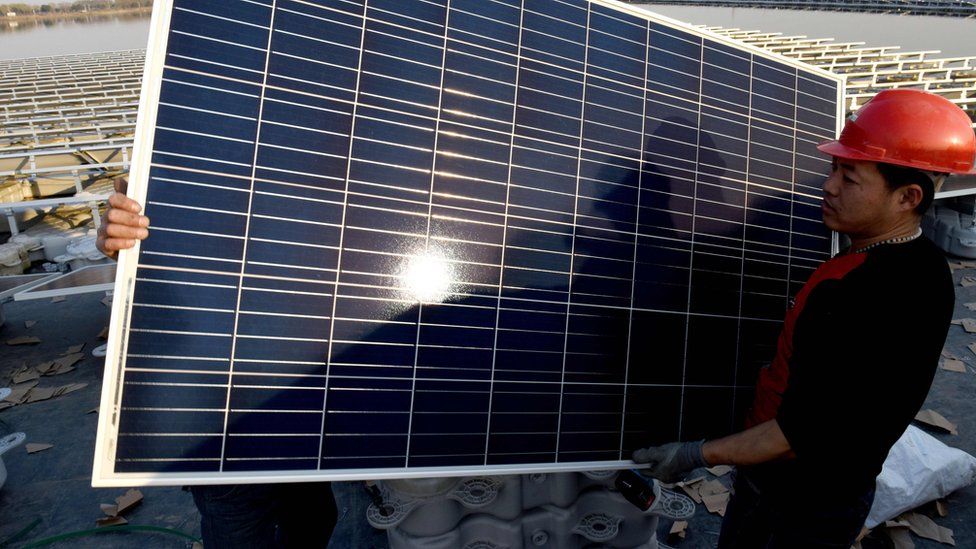'America First' tariffs: What will Trump's policy do?
- Published

Imported solar power cells and large household washing machines are likely to get more expensive in the United States.
They will be subject to new tariffs intended to protect American producers.
For solar cells the tariff will be up to 30% and for washing machines as much as 50%, although there will be exemptions and the tariffs are due to be phased out over the next few years.
Is the US playing by the rules?
China and South Korea, who are major suppliers of the affected goods, have - not surprisingly - protested.
South Korea in particular is planning a complaint to the World Trade Organization (WTO). The country's trade minister, Kim Hyun-chong, has said the US actions violate the WTO's rules.
There is, in fact, a basis in the rules that can allow countries to take the type of action the US is doing.
They are called safeguard measures. Countries can impose additional tariffs on imports of goods if there has been an increase that harms, or threatens to harm, a domestic industry.
But there are WTO rules on how to investigate the alleged harm and apply any new tariffs. Countries whose exporters are hit by any safeguard tariffs can make a complaint in the WTO's dispute system to argue that the measures have not been taken in a way that complies with those rules.
Donald Trump inauguration: 'America first, America first'
Has the US done this before?
President Donald Trump is not the first US leader to use this trade tool, but they don't do it frequently. The last occasion was 2001 under President George W Bush. That was over steel imports and several countries complained to the WTO.
US trade officials under President Barack Obama encouraged other countries not to use this approach in dealing with problems from competing imports.
The trouble with safeguards is that they are applied to imports from all suppliers (with some exceptions).
There are alternative tools available under WTO rules that are more selective, that target imports that are arguably traded unfairly. Countries can slap extra tariffs on imports if they are subsidised by the exporting country's government or sold cheaper than in the supplier's home market - that's known as dumping.
The US has used these alternatives more frequently and has tried them for both the types of goods involved in the new action: solar panels and washing machines. The Trump administration was clearly not satisfied with the results.
The administration's willingness to use the safeguards tool is very much in line with the more muscular approach it has taken to international trade policy, and a view of globalisation that is much more sceptical than that of his predecessors.
What happens next?
For the countries on the receiving end of the US measures, a WTO complaint is not a rapid response. Once countries notify the WTO that they are making a complaint, they then have to spend at least 60 days in "consultations" trying to resolve the dispute by discussing it with the other side.
Only then can they ask the WTO to set up a panel to hear the complaint and that generally takes months to reach a decision. The losing side can then appeal. The whole process can easily last a couple of years.
President Trump has also been very sceptical about the WTO's dispute system, claiming that the US "loses almost all the lawsuits" it is involved in.
It is not actually true; the US wins some and loses some. But if this one does go through the whole dispute process, it will provide fuel for the debate about the US's relationship with the WTO.
- Published23 January 2018
- Published14 April 2017
- Published11 January 2018
- Published8 December 2017
- Published16 December 2015
- Published22 June 2017
- Published2 November 2017
- Published24 November 2017